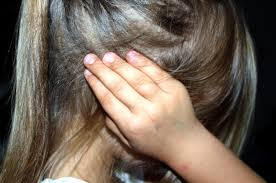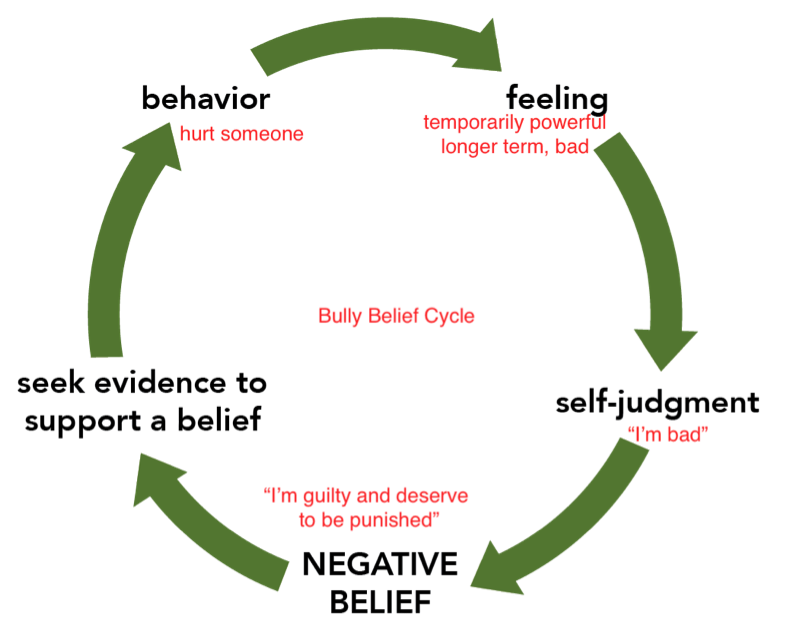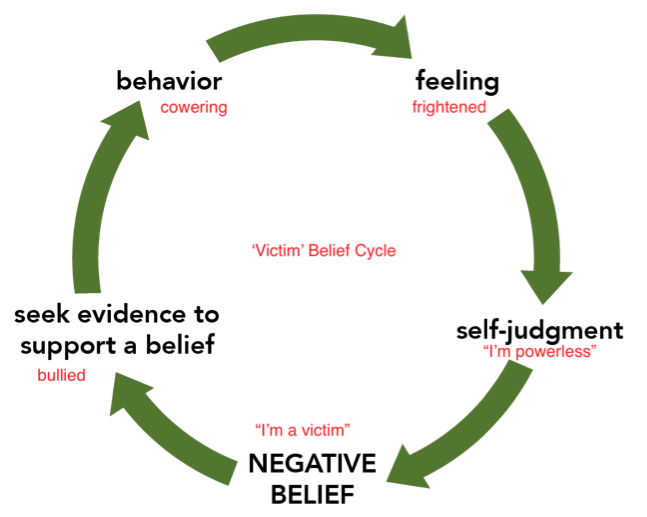|
What if we really could raise children to be bully-proof – neither bullies nor victims? It must be worth a try. What if we’ve got the bully / victim story completely wrong? This blog presents a radically different solution. In this blog, I’ll explain the root causes of bullying and why punishing the bully and commiserating with the victims actually makes matters worse. I’ll show what both bullies and victims gain from their experience, and suggests five strategies for parents and teachers that will help raise children who are less likely to be bullies and unlikely to be picked on as victims. The root causes of bullying In early childhood, children develop negative beliefs about themselves that are not true. These subconscious beliefs get started when a child first experiences emotions that are other than joy or love. In order to explain these uneasy feelings, children make up beliefs about themselves that are not true. These beliefs then feed their self-talk and demand evidence of their veracity, thus driving behaviours that substantiate them. A child who believes he is bad and deserves to be punished will behave in ways that will bring punishment to prove he is bad. A child who believes he is weak will act in ways that will prove it – by adopting a slouching stance, averting his eyes and giving out a ‘weak’ vibe, which bullies easily tune into. When the victim is bullied, his or her ‘weak and powerless’ belief is confirmed. Bullies need victims in order to be bullies and victims need bullies to be victims! Here’s how the bully and victim belief cycles interact: Bully cycle Victim cycle Ironically, bullies have the same underlying belief as victims – that they are weak and powerless. At an earlier stage, the bully must have been victimized in order for victimizing another to be possible. It is power (a mistaken form of self-worth) that the bully needs to establish by his behaviour.
Current anti-bullying programs focus on the symptoms of bullying rather than the causes and so they cannot work. Unless the underlying negative beliefs are tackled, the behaviour of the victim and the bully will continue. What’s in it for the bully? The reward for bullying behaviour for the bully is:
What’s in it for the victim? You may think that no one wants to be a victim and you would be right – no one makes a conscious choice to be bullied. There is, however, a payoff subconsciously for many victims. The victim:
The truth is that we are all victims until we choose to challenge that idea. We’ve all made up that we are weak and powerless based on our experiences in childhood. So, it is easy to see that all of us have the potential to be both a victim and a bully, and at different times in our lives we are likely to be both. Bullying behaviour needs to be recognized for what it is – a cry for love. A cry for love needs to be answered with love, so we need to offer compassion to bullies rather than punishment. Yes, their behaviour must change. If they are violent they will need to be kept apart, but the underlying negative beliefs need to be dealt with if the cause of the behaviour is to be addressed. Behaviour modification won’t work in the long run. Alarm bells may be ringing for you and you may be getting angry at the notion that we are excusing the bully and blaming the victim. Actually, we are getting rid of all blame. Neither the bully nor the victim is to blame. Neither has any choice in the matter as long as there are negative beliefs running the show. The solution is for the bully and the victim to heal together. Both need to heal the belief that they could be weak and powerless. The truth of them both is that they have Inherent Worth by virtue of simply being. No one is more or less powerful than anyone else – we all come into the world the same way and we can’t take anything with us when we leave. Children who truly understand their Inherent Worth will be neither bullies nor victims. Imagine a scenario in which a bully takes the lunch money of a victim. The fix is for both children meet with the Principal who then reminds them both that they are Inherently Worthy. Any problem that has been caused by the incident is then a problem to be solved when the emotion has been taken out of it. This seems far-fetched at present, but if the bullying epidemic is to subside, it is one that needs some serious consideration. How can we raise bully-proof children? Here are five strategies for helping children to realize their Inherent Worth – the antidote to all of the negative beliefs that are picked up in early childhood:
Healing negative beliefs that we are weak and powerless and adopting the sure knowledge that we are Inherently Worthy along with every other person on this earth will result in a kinder society. We can’t afford to ignore this approach at a time when politicians in many parts of the world are modelling bullying behaviour and our children are watching. Some questions to consider: Can you recognize your own ‘victim’ thinking? How might you respond differently in a bullying situation you are in? I love to hear your thoughts, so please leave a comment below, or contact me!
0 Comments
Leave a Reply. |
Author I know firsthand the emotional and financial costs of having a troubled teenager and I don’t want that to happen to you. That's why I wrote my book What They Don't Teach in Prenatal Class: The Key to Raising Trouble-Free Kids and Teens (available on Amazon). Archives
April 2022
Categories
All
|
get in touch
Email: [email protected] Tel: (1) 604 720 2776
Sign Up to my newsletter
Get information and articles about how to raise happy, mentally-healthy, and addiction-free kids!




 RSS Feed
RSS Feed